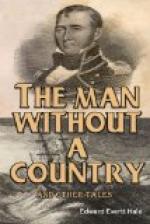But Seneca knew what was right. Seneca also had a well-trained conscience, which told him of right and of wrong. Seneca’s brother, Gallio, had saved Paul’s life when a Jewish mob would have dragged him to pieces in Corinth; and the legend is that Seneca and Paul had corresponded with each other before they stood together in Nero’s presence, the one as counsellor, the other as the criminal.[L] When Paul arose from that formal salutation, when the apostle of the new civilization spoke to the tottering monarch of the old, if there had been one man in that assemblage, could he have failed to see that that was a turning-point in the world’s history? Before him in that little hall, in that little hour, was passing the scene which for centuries would be acted out upon the larger stage.
Faith on the one side, before expediency and cruelty on the other! Paul before Seneca and Nero! He was ready to address Nero, with the eloquence and vehemence which for years had been demanding utterance.
He stood at length before the baby Caesar, to whose tribunal he had appealed from the provincial court of a doubting Festus and a trembling Agrippa.
And who shall ask what words the vigorous Christian spoke to the dastard boy! Who that knows the eloquence which rung out on the ears of astonished Stoics at Athens, which commanded the incense and the hecatombs of wandering peasants in Asia, which stilled the gabbling clamor of a wild mob at Jerusalem,—who will doubt the tone in which Paul spoke to Nero! The boy quailed for the moment before the man! The gilded dotard shrunk back from the home truths of the new, young, vigorous faith: the ruler of a hundred legions was nothing before the God-commissioned prisoner.




